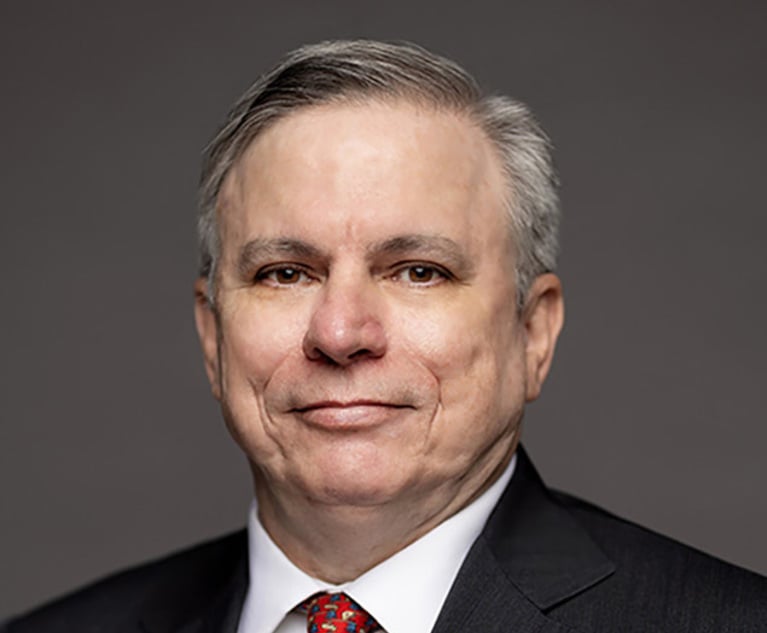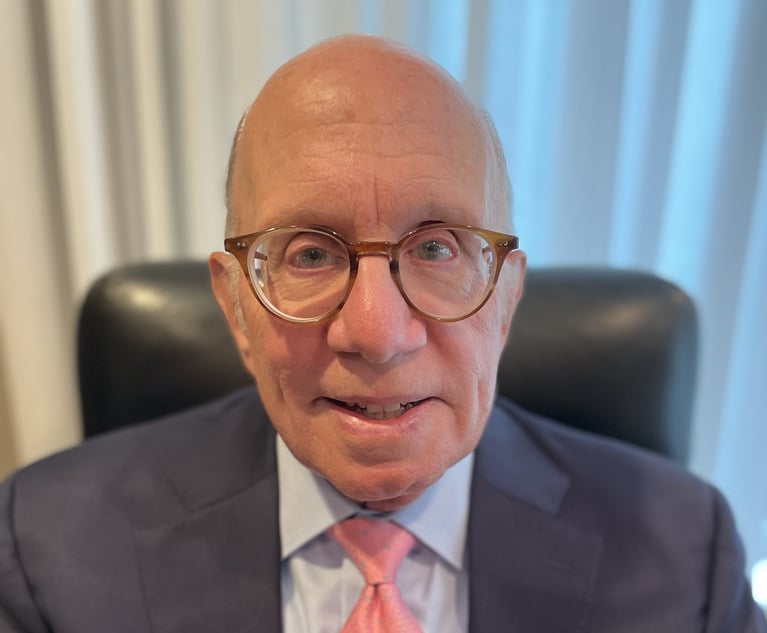To Deal With Racial Injustice, Don't Stop With Law Enforcement: Prosecutorial Conduct Matters Too
We will likely never see a gut-wrenching video of a prosecutor doing physical harm to a black defendant in court, but prosecutors occupy a critical role in the perpetuation of a system that so disproportionately impacts and imprisons the black community.
June 19, 2020 at 01:22 PM
7 minute read

As legislators and the public discuss the proper scope of immunity for those engaged in policing, and much needed reforms, it is critical that we focus also on the interwoven issue of prosecutorial conduct. It may be less compelling in some respects; we will likely never see a gut-wrenching video of a prosecutor doing physical harm to a black defendant in court. But prosecutors occupy a critical role in the perpetuation of a system that so disproportionately impacts and imprisons the black community. (Black People Are Charged at a Higher Rate than Whites, New York Times, June 12, 2019; NAACP Criminal Justice Fact Sheet). While statistics abound concerning both prosecutions and incarceration of minorities, a walk down the hall of any criminal court tells the story: the courtrooms are overflowing with young black men, aided only by overworked public defenders, who all too often are persuaded that a plea to a minor offense is their best option, not appreciating that they are permanently soiling their records and eliminating opportunities for employment. Prosecutors serve as both gatekeepers and sovereigns in this criminal justice system, determining whether and to what extent an individual is actually charged, and the resolution that will be available to him or her. There are, at this moment, substantial efforts to ensure that police are held accountable for misconduct. (Sibila, New Bill Would Abolish Qualified Immunity, Forbes.com, June 3). Judges across the country have issued highly unusual statements seeking to grapple with the extent to which they are "part of the problem." (Justices Grapple With Injustice, New York Times editorial, June 18). But attention should also be paid to the active and passive role of prosecutors in the racial inequities that plague the system because only if prosecutors become part of the solution can there be any meaningful progress on these issues.
The role occupied by prosecutors, and the need for reform, covers a broad swath of issues. We have known for some time that prosecutorial misconduct has been a contributing factor in wrongful convictions, and there have been calls to end the prosecutor's "cloak of absolute immunity" (Block, Fredric, Let's Put An End to Prosecutorial Immunity, March 3, 2018; Fritz and Lanciault, Prosecutorial Immunity: The Debate Reignited, NYLJ, March 29, 2019). Last March, Governor Andrew Cuomo signed into law the bill establishing a Commission on Prosecutorial Conduct but that effort was short lived. An association of district attorneys sued to prevent the implementation of the commission and in January, a New York judge declared the law unconstitutional (New York Court Rules Prosecutorial Misconduct Commission Unconstitutional, Wall Street Journal, Jan. 28). The court held that "it was clearly permissible for the Legislature to create a special investigatory body for prosecutors," to ensure "that any prosecution that is undertaken is conducted free from misconduct—safeguards that are within the purview of the Legislature to create." Nonetheless, the court found that the creation of "an entirely separate avenue of appellate review from that created by the constitution is both impermissible under, and inimical to, the constitutional framework." According to published reports, it is not clear if efforts presently continue to refashion a commission that would pass muster (New York Prosecutor Watchdog at Crossroads, Law 360, Feb. 9) .
Other conduct of prosecutors intersects precisely with the concerns regarding discriminatory actions or excessive use of force by police that are at the forefront today. In every instance, it is the prosecutor that is the first one to evaluate the case, consider whether there are issues concerning use of force or an unjustified stop, and decide whether a prosecution is justified. Too often, prosecutors turn a blind eye to issues concerning the conduct of the police, wanting not to alienate their law enforcement colleagues, maintaining that they are essentially required to charge where law enforcement has articulated a basis, and employing the rationale that it will all be aired during the course of the proceeding (Qualified Immunity Is Helping Police Get Away with Murder – And So Are Prosecutors, Newsweek.com). But once criminal charges are filed by a prosecutor, the machinery of criminal justice presses inexorably forward and it is a virtual certainty that the case will end in a disposition ordained not by a court but by the prosecutor.
Instead of mechanically proceeding with charges that have been leveled by the arresting officer, prosecutors should be encouraged to examine issues of police conduct prior to initiating a criminal case and carefully consider whether the charged conduct, e.g., a traffic issue or allegations of resisting arrest, warrants the use of the criminal justice system. Like police, prosecutors wield their own kind of force—the considerable power of the criminal justice system—and use of that force can also be excessive. Experienced prosecutors are uniquely qualified to evaluate those issues, and they have the authority and ability to decline to exercise their discretion not to prosecute those cases where that use of the force of the criminal justice system is disproportionate or discriminatory.
Prosecutors should also be required to report credible allegations of police misconduct, just as they would be obligated to report unethical conduct by another attorney. If they instead simply move the case forward, without addressing credible evidence of police misconduct, they should themselves be subject to scrutiny.
Even where there is no issue of use of force, prosecutorial discretion could and should be employed to prevent the use of the criminal justice to address each and every manner of societal dispute and turmoil. We are now openly acknowledging the need for a substantial change in law enforcement's interaction with the community, discussing the fact that police are the ones called to deal with so many societal disputes even though they have a very short menu of options to address those issues: they can make an arrest. As the old saying goes, to a hammer, everyone looks like a nail. We are now acknowledging that police should work more closely with social workers and mental health professionals rather than reflexively opting for criminal charges. So too, we can employ that approach even after the police have elected to file charges. Prosecutors, at the point of initial charging decision, should be using the same approach, considering from the outset whether criminal charges are the appropriate response to the individual and the conduct at issue.
But, one might argue, prosecutors are often young and ill equipped to make such decisions and so the charges filed (by an oftentimes equally young arresting officer) should simply be incorporated into a charging instrument and dealt with in court. According to conventional wisdom, once the police make an arrest, the system must run its course. But that is not even the present reality. Prosecutors are already making a crucial and life altering decision if they proceed with the filing of criminal charges in court. They are as qualified, if not more so, than an arresting officer to decide if a case warrants criminal prosecution. And if they are not qualified to make that decision, then they should be, and training or standards should be improved. The Legislature should, once again, work to establish an independent commission on prosecutorial conduct, guided now by both the January decision concerning its legality and the conversation occurring today.
Maranda Fritz, a former prosecutor, is a white-collar criminal defense attorney at Maranda E. Fritz PC.
This content has been archived. It is available through our partners, LexisNexis® and Bloomberg Law.
To view this content, please continue to their sites.
Not a Lexis Subscriber?
Subscribe Now
Not a Bloomberg Law Subscriber?
Subscribe Now
NOT FOR REPRINT
© 2024 ALM Global, LLC, All Rights Reserved. Request academic re-use from www.copyright.com. All other uses, submit a request to [email protected]. For more information visit Asset & Logo Licensing.
You Might Like
View All
Why Is It Becoming More Difficult for Businesses to Mandate Arbitration of Employment Disputes?
6 minute read
Trending Stories
Who Got The Work
Michael G. Bongiorno, Andrew Scott Dulberg and Elizabeth E. Driscoll from Wilmer Cutler Pickering Hale and Dorr have stepped in to represent Symbotic Inc., an A.I.-enabled technology platform that focuses on increasing supply chain efficiency, and other defendants in a pending shareholder derivative lawsuit. The case, filed Oct. 2 in Massachusetts District Court by the Brown Law Firm on behalf of Stephen Austen, accuses certain officers and directors of misleading investors in regard to Symbotic's potential for margin growth by failing to disclose that the company was not equipped to timely deploy its systems or manage expenses through project delays. The case, assigned to U.S. District Judge Nathaniel M. Gorton, is 1:24-cv-12522, Austen v. Cohen et al.
Who Got The Work
Edmund Polubinski and Marie Killmond of Davis Polk & Wardwell have entered appearances for data platform software development company MongoDB and other defendants in a pending shareholder derivative lawsuit. The action, filed Oct. 7 in New York Southern District Court by the Brown Law Firm, accuses the company's directors and/or officers of falsely expressing confidence in the company’s restructuring of its sales incentive plan and downplaying the severity of decreases in its upfront commitments. The case is 1:24-cv-07594, Roy v. Ittycheria et al.
Who Got The Work
Amy O. Bruchs and Kurt F. Ellison of Michael Best & Friedrich have entered appearances for Epic Systems Corp. in a pending employment discrimination lawsuit. The suit was filed Sept. 7 in Wisconsin Western District Court by Levine Eisberner LLC and Siri & Glimstad on behalf of a project manager who claims that he was wrongfully terminated after applying for a religious exemption to the defendant's COVID-19 vaccine mandate. The case, assigned to U.S. Magistrate Judge Anita Marie Boor, is 3:24-cv-00630, Secker, Nathan v. Epic Systems Corporation.
Who Got The Work
David X. Sullivan, Thomas J. Finn and Gregory A. Hall from McCarter & English have entered appearances for Sunrun Installation Services in a pending civil rights lawsuit. The complaint was filed Sept. 4 in Connecticut District Court by attorney Robert M. Berke on behalf of former employee George Edward Steins, who was arrested and charged with employing an unregistered home improvement salesperson. The complaint alleges that had Sunrun informed the Connecticut Department of Consumer Protection that the plaintiff's employment had ended in 2017 and that he no longer held Sunrun's home improvement contractor license, he would not have been hit with charges, which were dismissed in May 2024. The case, assigned to U.S. District Judge Jeffrey A. Meyer, is 3:24-cv-01423, Steins v. Sunrun, Inc. et al.
Who Got The Work
Greenberg Traurig shareholder Joshua L. Raskin has entered an appearance for boohoo.com UK Ltd. in a pending patent infringement lawsuit. The suit, filed Sept. 3 in Texas Eastern District Court by Rozier Hardt McDonough on behalf of Alto Dynamics, asserts five patents related to an online shopping platform. The case, assigned to U.S. District Judge Rodney Gilstrap, is 2:24-cv-00719, Alto Dynamics, LLC v. boohoo.com UK Limited.
Featured Firms
Law Offices of Gary Martin Hays & Associates, P.C.
(470) 294-1674
Law Offices of Mark E. Salomone
(857) 444-6468
Smith & Hassler
(713) 739-1250








